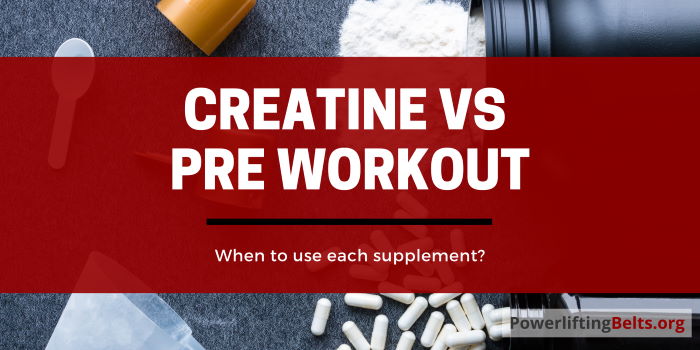
Creatine or pre-workout? Which should you take before a workout? What are the benefits of each supplement type? What do they do differently?
When it comes to building muscle, creatine and pre-workout supplements can do a similar job. In order to build muscle, you must expend energy during exercise.
Creatine and pre-workouts are some of the more popular types of supplements around to enhance your performance. They have both been around for a long time. They both offer benefits that you will enjoy, as well as drawbacks.
If you don’t know what they are, what they do, or the difference between them – check out this article on their difference and how they can help your gym performance.
Why Should You Take Supplements?
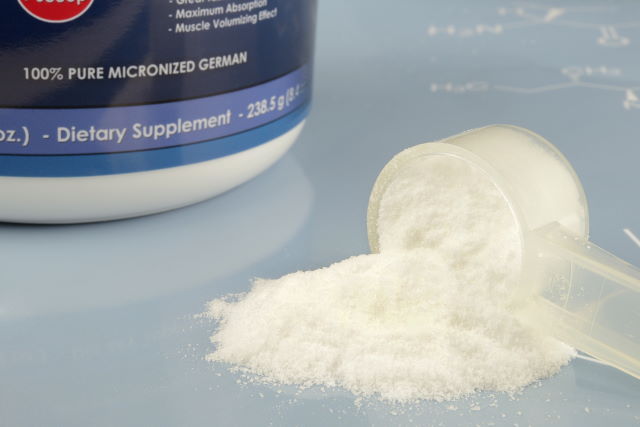
A lot of people think supplements are only for those who need help – but, truth be told, most people can benefit from using the correct ones.
You should always keep in mind that supplements will help you as long as you have the basics covered. Diet, rest, and exercise need to be dealt with before you start thinking about taking any supplements.
Think about it like this: supplements are like walking the extra mile. It will make a difference – but only if you already have exhausted all other options! For example, the right amount of a pre-workout supplement can help you push extra hard if you have your diet covered. It’s not a meal replacement.
What Kind Of Supplements Should You Use?
There are countless supplements out there. A lot of them work – but many of them don’t. Veteran gym-goers know their way around which bodybuilding supplements to take for the best workout performance or to reduce body fat, but that’s something that comes from experience.
If you’re new to supplements, creatine and pre-workout are what you are likely to try initially. There are many things that the fitness community doesn’t agree on, but when it comes to creatine and pre-workout, everyone knows that they work. Both science and experience back them up.
What Is Creatine?
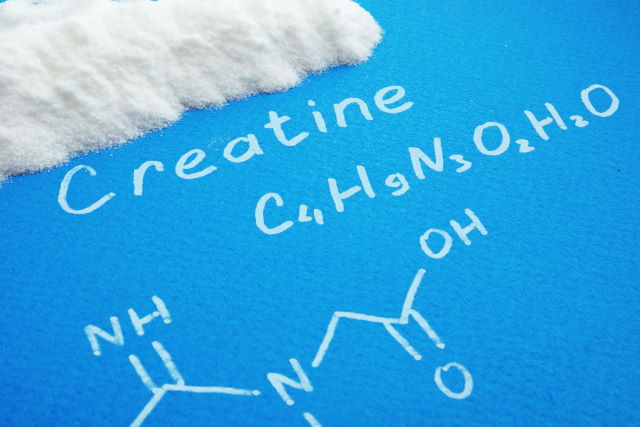
Creatine is not just a supplement. It’s a natural compound found in your body. Whenever you’re eating meat, you’re ingesting creatine. This makes it easy for people who are vegetarian or vegan to use this supplement, as they aren’t getting it from their diet.
Your body also produces creatine in the kidneys and liver.
Creatine is geared toward building muscle and increasing strength by increasing the adenosine triphosphate (ATP) levels which the body converts to creatine phosphate. These creatine stores improve exercise performance but a loading phase is required to build up phosphocreatine stores in the body.
Low ATP levels mean more muscle fatigue and increased muscle soreness after your workout.
The following table shows how to consume creatine during the loading and maintenance phases:
| Phase | Days | Dosage | Frequency |
| Loading | 7 | 20g per day | (5g) 4x per day |
| Maintenance | As long as required | 5g per day | 1x per day |
It is normal for bodybuilders to consume a high amount for a few days and then maintain their ATP levels with a lower dose after.
The supplement is useful for improving power output, physical endurance and reducing muscle breakdown. It also improves muscle cell hydration and muscle protein synthesis.
The International Society of Sports Nutrition found creatine to be the best dietary supplement for improving high-intensity exercise and lean body mass.
But your muscle tissue should be saturated with creatine phosphate to get the best athletic performance improvements from it. This might lead you to believe that more creatine supplementation will mean more muscle growth – but that is not necessarily the case!
Consuming 2-5 grams of creatine per day has been shown to increase lean muscle mass.
Creatine also lets you push through muscle fatigue in the gym more than you would without it.
Many people supplement their creatine intake. That’s the type that you buy in powder form. If you want to have bigger muscles, you need to take creatine.
What Is Pre-Workout?
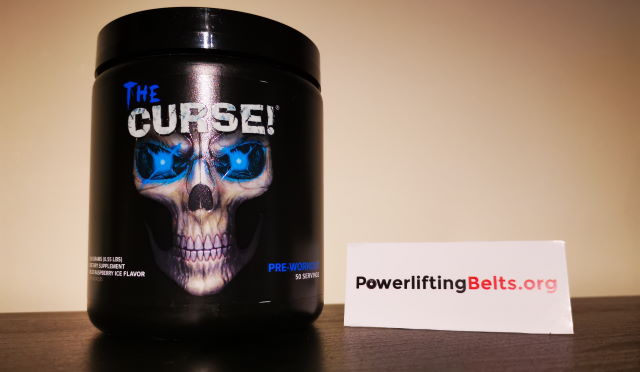
Pre-workout, unlike creatine, is not found organically in your body. It also produces a different effect but is also designed to enhance performance.
Keep in mind that “pre-workout” is a broad term for all sorts of things and their ingredients can vary greatly. Most pre-workout products have caffeine and other stimulants in them. These provide a feeling of having higher energy levels.
The levels of caffeine vary a lot between products so be sure to check the dose per serving. Excessive caffeine can lead to jitters, increased blood pressure, and dehydration. It is also not recommended to consume a pre-workout supplement near bedtime as it can negatively affect your sleep.
They sometimes also contain essential amino acids or branched-chain amino acids and l-citrulline to support workouts. L-citrulline is converted to nitric oxide in the body which relaxes the blood vessels and improves blood flow to muscles.
Another key common ingredient in pre-workouts is beta-alanine. This is scientifically proven to improve stamina and muscular endurance by increasing carnosine levels which reduce lactic acid accumulation in the muscles.
Related: The Top Tasting Pre Workout Supplements
They’re there to give you enough of a kick to help you kill it in the gym by enhancing blood flow and cognitive function.
It’s impossible to know what your pre-workout is made of without reading the product’s label. Creatine, on the other hand, is generally always the same but quality can vary.
An issue with pre-workouts is that they may sometimes not contain effective amounts of some ingredients. That is called a proprietary blend. These proprietary blends only show the combined amounts of active ingredients used in the blend. The exact amount of each is not disclosed.
Many of the large manufacturers of proprietary blends use them for a number of reasons:
- To prevent competitors from knowing the exact amount of each ingredient in a supplement.
- For marketing reasons, having a lot of ingredients on the label will cause consumers to believe that they are getting a better product.
- Cheaper supplements can be made by just having a trace amount of an ingredient. This way it can be included on the label but the actual amount will not be effective.
The Differences Between Creatine And Pre-Workout
Creatine supplements and pre-workouts have similar purposes. Most pre-workouts contain creatine monohydrate as an ingredient.

Simply put, creatine is found naturally in your body and comes from dietary sources. But you can’t get enough creatine with a normal diet, so creatine supplementation is required from its powder form. So it is usually taken every day by athletes and bodybuilders.
If you’ve worked out today already, taking pre-workout would be a waste of time.
Pre-workout, on the other hand, comes into play earlier than creatine and covers more bases. While creatine increases muscular strength and endurance, pre-workout can enhance workouts by stimulating brain function, and mental focus, increasing blood flow as well as enhancing exercise performance.
Related: Top Pre Workouts For Mental Focus
Can Creatine And Pre-Workout be Taken Together?
Yes, of course! You should take both for optimal results. Especially as pre-workouts often include creatine. As you know by now, they will help both help you with your gym session and creatine will help you recover better after you’re done lifting.
Take your creatine in the morning with your multivitamins and your pre-workout before going to the gym.
If you’re lifting on a budget and you have to choose between either one, you should go with creatine. It’s often cheaper! These supplements contain stimulants, so you may be able to drink a big cup of coffee instead of pre-workout. Also, with plenty of rest and a good diet, taking it might be redundant. Creatine, on the other hand, will help you no matter what.
Combining Pre-Workout With Creatine
Whenever you’re taking supplements of any kind, you need to remember that they are not a magic fix. Remember that you need to cover your basics (diet, exercise, and sleep) before supplements can truly make a difference.
One thing to note with creatine is that you should drink plenty of water throughout the day while taking it as it an lead to dehyrdration. Increasing weight due to water retention is also common when consuming creatine.
If you’re struggling with your lifts because of bad sleep, pre-workout won’t be as effective as it would if you slept well.
Don’t worry if you can’t afford creatine or pre-workout! You can still make huge improvements in the gym by training and eating right alone. Supplements are helpful but in no way essential!
Other Useful Supplements
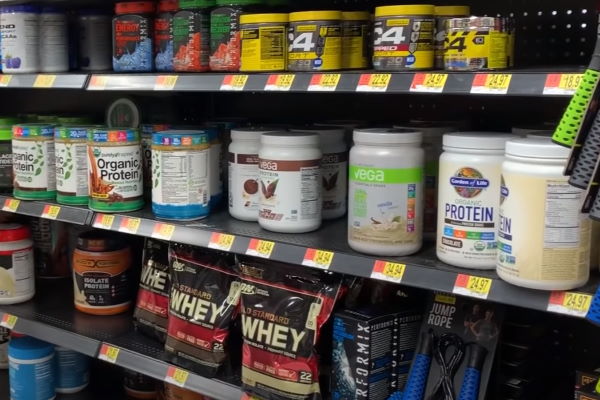
There are tons of supplements out there that can help you in your lifting journey. Protein powders assist with muscle recovery by adding much-needed nutrients required by the body. BCAA helps with maintaining muscle mass when on a calorie deficit.
Vitamin B will help you recover better. Vitamin D3 will help you with almost all things health-related. Magnesium helps you improve your sleep quality.
It all depends on what you may have a deficiency in. If you receive plenty of sunlight every day, there’s no need to take vitamin D3. If you have a great diet, you might not need Vitamin B. It’s all about who you are and what you need – and only you can answer that question!
Leave A Comment